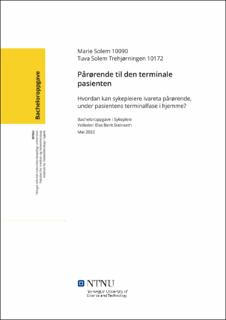| dc.contributor.advisor | Steinseth, Else Berit | |
| dc.contributor.author | Solem, Marie | |
| dc.contributor.author | Trehjørningen, Tuva Solem | |
| dc.date.accessioned | 2022-07-05T17:19:26Z | |
| dc.date.available | 2022-07-05T17:19:26Z | |
| dc.date.issued | 2022 | |
| dc.identifier | no.ntnu:inspera:106262086:112059487 | |
| dc.identifier.uri | https://hdl.handle.net/11250/3002827 | |
| dc.description.abstract | Bakgrunn: Norge er en av de landene i verden hvor færrest dør hjemme. Noe av grunnen til dette kan være mangel på ressurser og dårlig tilrettelegging fra helsevesenet. Ved å presentere sykepleieteori og faglitteratur rundt kommunikasjon og sorg i terminale fasen, kan vi belyse hvordan sykepleiere bør ivareta pårørende.
Hensikt: Belyse hvordan sykepleiere kan ivareta pårørende til terminale pasienter, og se på hvilke faktorer som skal til for å ivareta dem på best mulig måte.
Metode: Denne bacheloroppgaven er basert på et litteraturstudium, hvor fag-, pensum- og forskningslitteratur er brukt. I tillegg brukte vi databasene, Ovid Medline og Cinahl som er brukt for å finne relevant forskningslitteratur. Fem vitenskapelige artikler er da inkludert for å besvare vår problemstilling.
Resultat: De fem vitenskapelige artiklene peker på fem hovedfunn som har betydning for ivaretagelsen av pårørende: Organisering og tverrfaglig samarbeid, identifisering av behov, emosjonell støtte, kompetanse og kommunikasjon.
Diskusjon: I drøftingskapittelet trekkes både pårørendeperspektivet og sykepleieperspektivet frem. De fem hovedfunnene fra resultatet vil deretter blir drøftet for å finne ut av hvordan sykepleiere kan bedre ivareta pårørende.
Konklusjon: For å ivareta pårørende spiller sykepleieren en sentral rolle for hvordan pårørende opplever rollen som omsorgsperson, ved terminal pleie i hjemmet.
Ett godt tverrfaglig samarbeid, anerkjennelse av pårørendes behov, god kommunikasjon og informasjonsflyt og faglig kompetanse hos sykepleierne, viser seg å være viktig for å ivareta pårørende. | |
| dc.description.abstract | Background: Norway is one of the countries with the lowest rate of home deaths. This could be due to a lack in recourses and poor facilitation from the health care system. We will be presenting nursing theory and scientific literature around communication, grief and terminal care.
Aim: To shed light on how nurses can care for relatives of terminally ill patients and look at what factors are needed to take care of them in the best possible way.
Methodology: This bachelor’s assignment is based on a literature study, where subject-, curriculum-, and research literature are being used. In addition we used the databases, Ovid Medline and Cinahl, to fined relevant research literature. In total, five scientific articles are included to answer our research problem.
Results: The five scientific articles point to five main findings that are important for the care of relatives: organization and interdisciplinary collaboration, identification of needs, emotional support, competence and communication.
Discussion: We will discuss both the relatives' perspective and the nursing perspective. The five main research findings from our results will be used in the discussion to see how nurses can better care for the relatives of terminally ill patients.
Conclusion: In order to take care of relatives, the nurse plays a pivotal role in how relatives experience the role of caregiver, in terminal care in the home.
Good interdisciplinary collaboration, recognition of the relatives' needs, good communication and flow of information as well as professional competence among the nurses, prove to be important for caring for relatives. | |
| dc.language | nob | |
| dc.publisher | NTNU | |
| dc.title | Pårørende til den terminale pasienten | |
| dc.type | Bachelor thesis | |
